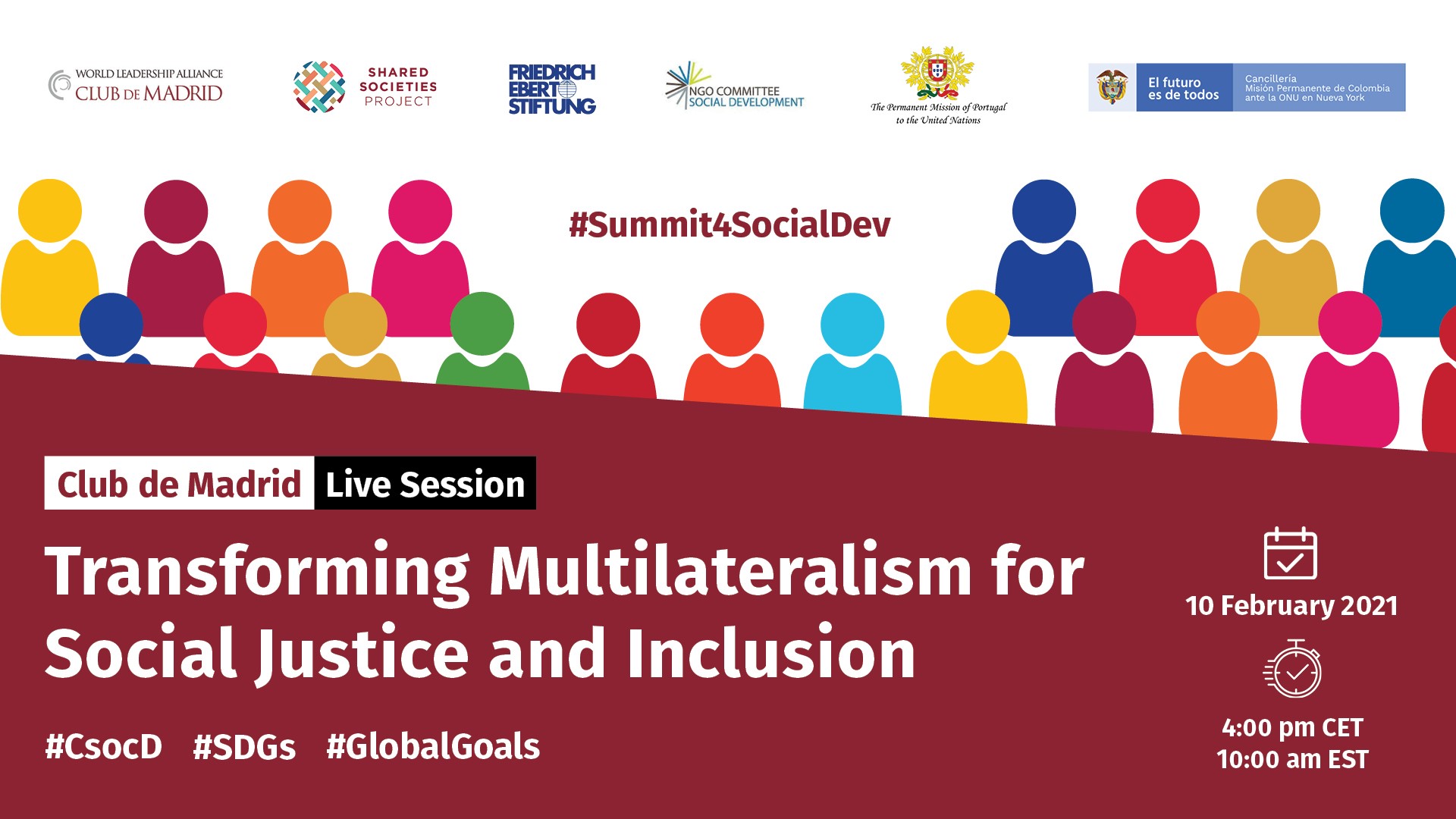
Club de Madrid and the Friedrich-Ebert-Stiftung presented policy recommendations on Transforming Multilateralism for Social Justice and Inclusion at a CSocD59 side-event, where they were joined by representatives of the International Trade Union Confederation, the NGO Committee on Social Development and the Permanent Missions of Colombia and Portugal to the UN. To spur global action on social justice and inclusion, they now call for a new World Summit on Social Development.
COVID-19 has evidenced dynamics of inequality and exclusion in societies around the world, with some communities disproportionately suffering from the health and economic crisis. Digital technologies have been powerful instruments of resilience, but the digital divide has excluded millions. This underscores the importance of inclusion to keep countries on the path to Agenda 2030 and strengthen our collective resilience to future crises. Building shared societies, based on social justice and equity, can no longer remain a guiding principle: it must be placed at the core of our efforts.
Last October, at Club de Madrid’s Annual Policy Dialogue, a Working Group chaired by the Friedrich-Ebert-Stiftung developed policy recommendations on Transforming Multilateralism for 21st Century Social Justice and Inclusion. They made proposals on social protection, tax reform and debt relief; and they called for a new global compact on social development. On 10 February, these recommendations were presented to the broader UN community in a side event to the 59th Session of the Commission for Social Development, chaired by FES Senior Policy Analyst, Sara Burke.
International Trade Union Confederation General Secretary, Sharan Burrow, introduced the recommendations of the Working Group, noting that they represent a convergence of understanding among many sectors of society. Club de Madrid President and former President of Slovenia, Danilo Türk, then engaged in a lively dialogue with former Ambassador of Chile to the UN, Juan Somavía, around the need for a new World Summit on Social Development. Building back better, they argued, requires reaffirming our commitment to the Sustainable Development Goals and revisiting our social contract in light of the COVID-19 experience, with people at the centre. That is a challenge, but the UN can deliver.
In the ensuing discussion, Ambassador of Colombia to the UN, H.E. Guillermo Fernández de Soto, and Deputy Permanent Representative of Portugal, Nuno Mathias, echoed the call for a multilateral approach to social inclusion and highlighted examples of leadership from their countries on this issue. The Co-Chair of the NGO Committee on Social Development, Maria Fornella-Oehninger, emphasized the importance of civil society participation at all stages of multilateral efforts to strengthen social justice and inclusion.
Strong with a growing community of like-minded partners, Club de Madrid and FES reaffirm their commitment to a multilateral approach to social justice and inclusion in Time to Shake the Trees, a short video that was presented during the closing session of the Civil Society Forum 2021 on 12 February. In an effort to spur global action on social justice and inclusion, the two organizations call for a new World Summit on Social Development by 2025. Who’s in?
AUDIO-VISUAL RESOURCES:
Transforming Multilateralism for 21st Century Social Justice and Inclusion – The report of the Working Group on Social Justice and Inclusion, coordinated by the Friedrich-Ebert-Stiftung at Club de Madrid’s Annual Policy Dialogue 2020 on Multilateralism that Delivers. Available for download here.
Time to Shake the Trees – A 3:31 minute video calling for a new Social Summit on Social Development. Available on Club de Madrid’s YouTube channel.
The integral video of the side event: https://youtu.be/AyZFcWy5ZQ0
PICTURE:

@clubdemadrid and @FESonline tell us it's time to shake the trees for social justice and inclusion. They call for a new World Summit on Social Development! #Summit4SocialDev #SharedSocieties #CsocD #SDGs #GlobalGoals.
 Welcome to the United Nations
Welcome to the United Nations